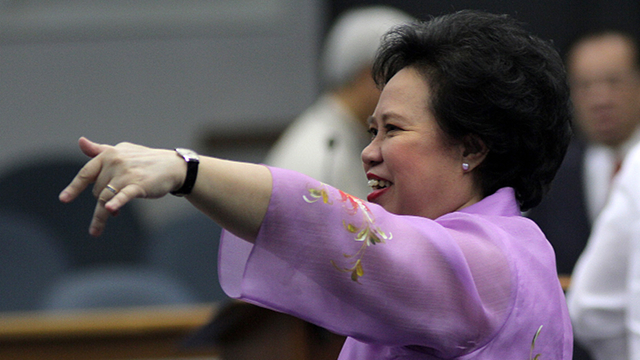SUMMARY
This is AI generated summarization, which may have errors. For context, always refer to the full article.

MANILA, Philippines – Sen Miriam Defensor Santiago bid 2012 goodbye by hailing the Reproductive Health (RH) law as the peak of her year.
“The RH law is the highlight of my year as a senator and as a woman. I thank all those who made this possible,” Santiago posted on her Twitter account @senmiriam on Monday, December 31.
The RH law co-sponsor wrapped up her journey in pushing for the bill through an opinion piece for CNN titled, “Leave no woman behind: Why we fought for Reproductive Health Bill.”
President Benigno Aquino III signed the RH bill into law last December 21 after Congress ratified it on December 19. The law funds the distribution of free contraceptives, requires public hospitals to provide RH services, and mandates sex education in public schools.
Santiago said that the law is aimed at giving poor women the freedom of informed choice. She added that the Philippines remains one of the poorest countries because it refused to acknowledge the need for an RH law.
“Not having a reproductive health law is cruelty to the poor. The poor are miserable because, among other reasons, they have so many children. Providing reproductive knowledge is the humane thing to do.”
She added, “In short, the bill merely wants to empower a Filipino woman from the poorest economic class to march to the nearest facility operated by the Department of Health or the local government unit, to demand information on a family planning product or supply of her choice.”
The senator said the 14-year battle to get the RH bill moving from “the dustbins of Congress” was difficult because of opposition from the Catholic Church.
Catholic bishops argued that the RH law promotes promiscuity and a “contraceptive mentality.” They campaigned against the passage of the law but failed to muster the votes with Aquino pushing for its passage.
Santiago said, “We were like David against Goliath. We fought long and hard, and in the end we prevailed.”
“Reproductive health care is a human right. The people are entitled to demand it from their government and the government is obligated to provide it to its constituents.”
‘Not fascist diktat of totalitarian power’
Santiago said that while Filipino Catholic bishops oppose RH, most Catholic countries already passed RH laws like Italy where the Vatican is located, Spain, Portugal, Mexico and Argentina.
“If the bill is highly controversial, it is not because it is dangerous to humans or to the planet. It is not subversive of the political order. It is not a fascist diktat of a totalitarian power structure.”
“The reason this bill is emotionally charged is because of the fervent opposition of the Catholic Church in the Philippines and those who wish to be perceived as its champions.”
The RH proponent said other major religious groups in the Philippines supported the RH law, including the Assembly of Darul-Iftah of the Autonomous Region in Muslim Mindanao, which she described as “the most authoritative body of Islamic clerics in the Philippines.”
She also cited public opinion surveys showing that majority of Filipinos are in favor of the law.
“This is the will of the Filipino people; it is the democratic expression of what the public wants from government. The anti-RH groups are mute on this ineluctable fact.”
In his blog, retired Archbishop Oscar Cruz expressed a different opinion.
“Population Control in the Philippines – under any deceptive title or manipulative design such as ‘Reproductive Health’ – ultimately means the following: that the people are the enemy of the government and should be then accordingly controlled by it according to its own desire and design.”
“That with a minimum population, resources infallibly become abundant, wealth becomes readily theirs and everybody is happy. It is as plain and simple as this: Depopulation equals benediction!”
Cruz said RH advocates see the elderly as “at the base of the population human pyramid” while the young are on top.
“Such inverted human pyramid is the preamble to social disorder,” Cruz said.
Next battle in Supreme Court?
While Santiago is in a celebratory mood, staunch RH critic Senate President Juan Ponce Enrile urged groups opposed to the law to question it before the Supreme Court.
In an interview on radio dzBB on Sunday, Enrile said RH critics can cite the constitutional provision declaring that the state must protect the family, the life of the mother and the life of the unborn from conception.
“Any law can be challenged before the Supreme Court, not only the RH law but any bill that becomes law like the sin tax measure,” Enrile said.
Enrile was a rabid critic of the RH bill, saying population control will harm the economy. He said he was against the bill because overseas Filipino workers are the country’s biggest exports.
The anti-RH group Catholic Vote Philippines and some bishops have vowed to campaign against pro-RH lawmakers in the May 2013 polls.
Jaro Archbishop Angel Lagdameo said they consider going to the Supreme Court as a “last recourse.” – Rappler.com
Add a comment
How does this make you feel?
There are no comments yet. Add your comment to start the conversation.